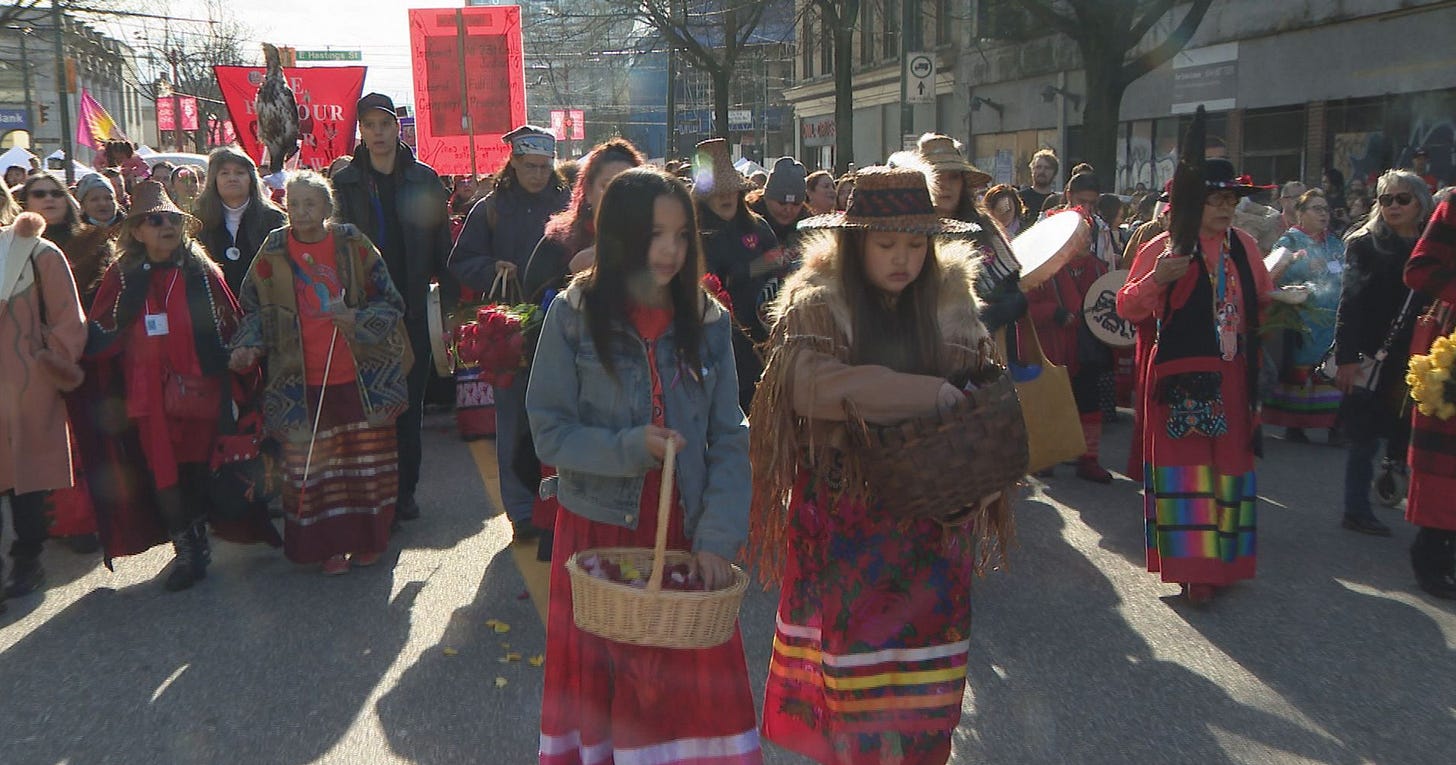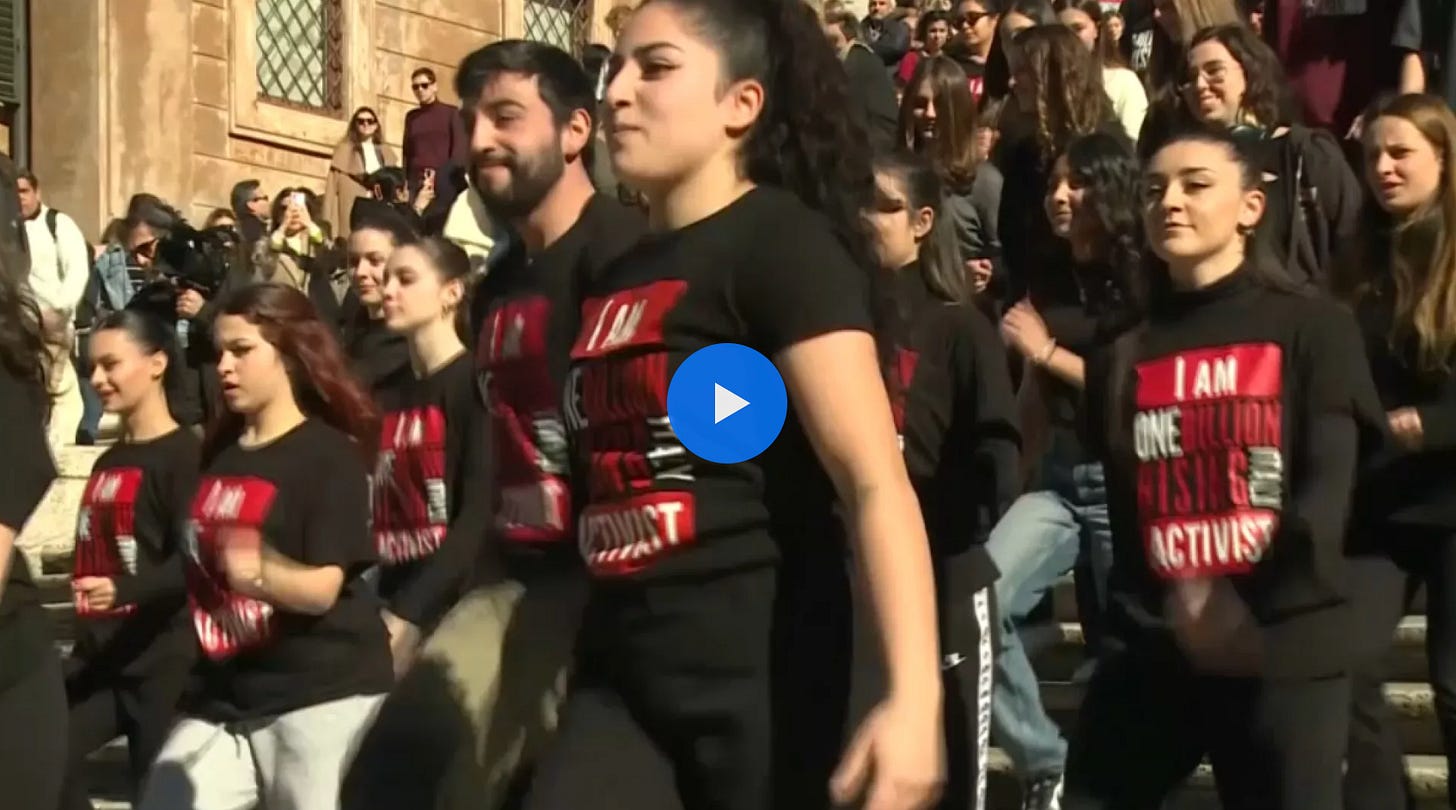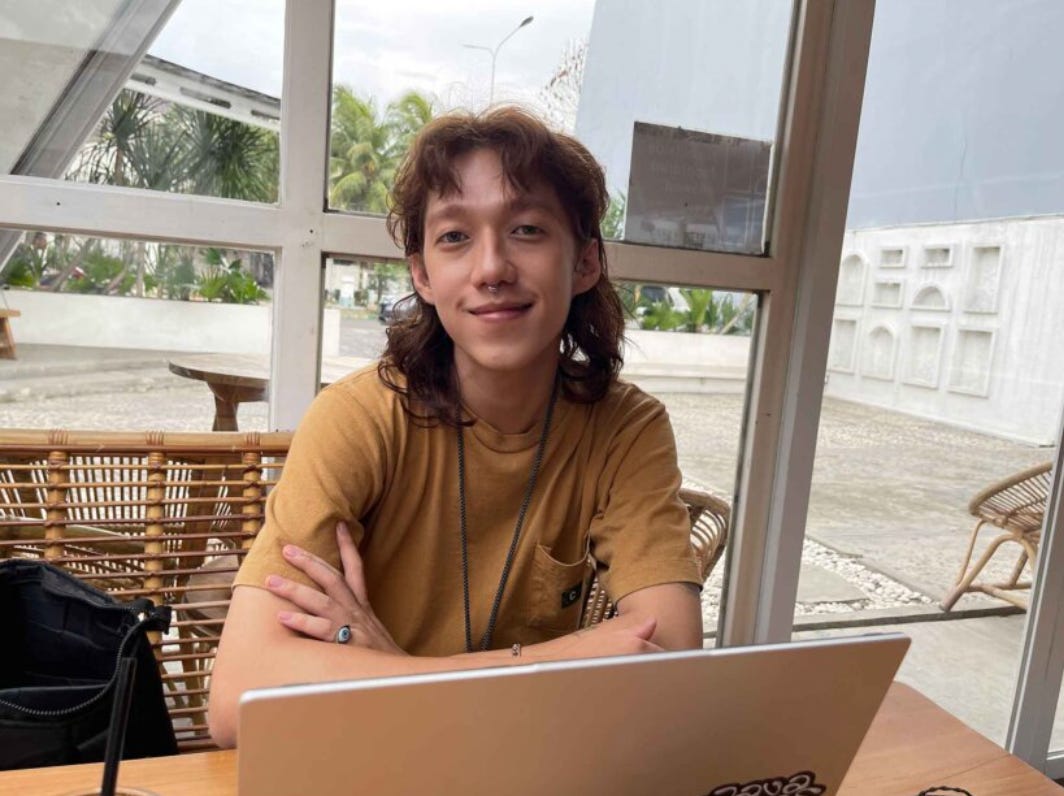Global Roundup: MMIWG2S+ Memorial March, Italy GBV Flash Mob, Indonesia Elections & Queer Community, South Africa Black Queer Lives, Saudi Arabia Woman MMA Fighter
Curated by FG Contributor Samiha Hossain
Crowds gathered for the Women’s Memorial March in Vancouver, Canada, February 14, 2024 CityNews image
Hundreds of people walked through Vancouver, Canada, on Wednesday, to mark the 33rd annual Women’s Memorial march in honour of Missing and Murdered Indigenous Women, Girls, and Two Spirit. Held on Valentine’s Day, the march occurs in cities across Canada every year to raise awareness and remember MMIWG2S+.
Some travelled across the border to share their story. Led by the youth this year, the march made its way through the Downtown Eastside, making stops and laying flowers where missing and murdered women and girls were last seen. The march included a gathering of victims’ family members and featured speeches from activists, and culminated in a healing circle in the afternoon and a community feast in the evening.
There’s women and girls that are suffering, and there’s women that were killed, and there’s girls that were killed and that can be in landfills right now. And there’s people out there who don’t even care to look. -Sariah Jacobs-Greene, a march leader
The march was first held in 1992, following the murder of a shíshálh Nation woman, Cheryl Ann Joe. The Native Women's Association of Canada maintains a list of nearly 600 cases of missing and murdered Indigenous women, girls, and two-spirit people across the country, over the span of 20 years.
It's sad we have to come and remind everybody every year. But it's also a good thing to see so many advocates here to push the levels of government and general society that this is still occurring. The immediate families are not alone, there is support out there from the other families and the general public. -Terry Teegee, Assembly of First Nations B.C. Regional Chief
The organizers of the annual event said the march continues to be a vital way to honour the loss still fresh for many families, but also to recognize that Indigenous women and 2SLGBTQ+ people continue to "face physical, mental, emotional, and spiritual violence on a daily basis," according to a statement.
Every 14th of February, the women's rights group One Billion Rising stages dance protests to call for an end to gender-based violence and show global solidarity for women and girls. They are known for staging dance protests around the world to raise awareness about gender-based violence. This year in Rome, as part of a series of events held in the Italian capital by the organisation, 20 dancers and 50 students from Dante Alighieri High School staged a flash mob on the Spanish Steps.
Those who have suffered violence would like to erase their bodies. But through this joyful and powerful event, we say we must begin to listen to our bodies, as part of the solution. -Linda Foster, artistic director for the event
One Billion Rising has its roots in the V-Day Movement of the late 1990s, and was founded by Eve Ensler, author of "The Vagina Monologues". The organisation invites a billion women to rise, dance, and connect worldwide to demand an end to this violence to show collective strength and global solidarity across all borders. Since 2013, the collective has been meeting every 14th of February in the streets and squares of 190 countries around the world to dance together to the notes of “Break the Chain". Participants can learn the choreography online.
According to One Billion Risin' and the UN Population Fund, violence against women and girls is one of the most prevalent, widespread and systematic human rights violations in the world.
This type of violence knows no social, economic or national boundaries. It is estimated that 35% of women have suffered violence at some point in their lives. In some countries, this number is as high as 70%.
Chris Derek. Photo Syadinar
Chris Derek is a 26-year-old non-binary design graduate who lives in Tangerang, near Indonesia’s capital Jakarta. Derek said certain politicians have historically leveraged anti-LGBTQ+ rhetoric as a campaign strategy in several past elections. They said such politicians raise the issue to garner support from anti-LGBTQ+ factions and secure votes.
For the past three elections, which were in 2014, 2019, and now in 2024, they have been using the same tactic over and over again. -Chris Derek
Dédé Oetomo, founder and trustee of GAYa NUSANTARA Foundation, a group advocating for Indonesia’s gender and sexual minorities, said that persecution and online hate speech targeting the community remain prevalent in the country whether there is an upcoming election or not. He further noted that neither politicians nor members of the LGBTQ+ community had any contact with him on election-related matters as the voting day nears.
People like me will ask: is there an anti-[LGBTQ+] discrimination guarantee? We know the central government cannot control everything. The [ideal] future still has a long way to go, but it has started. Life goes on, election or no election. -Dédé Oetomo
Meanwhile, queer activist Nurdiyansah Dalidjo said that while elections ought to serve as a time to celebrate and engage in the democratic process, it appears that the atmosphere during several recent election cycles "has not been pleasant," particularly for members of the country's queer community. "Atlas," a non-binary Jakarta-based content creator, said certain politicians have portrayed the LGBTQ+ community in a "divisive" manner, rather than adopting "a more humanistic approach." Atlas said that some candidates encourage people to "beware" of the queer community. The 26-year-old, who identifies as bisexual, said the politicians' actions against the community worsened around this election compared to previous polls in 2019 and 2014.
Echa Waode, a trans rights activist in Indonesia pointed out a significant degree of discrimination in the employment sector, based purely on individuals' sexual orientation or their association with certain communities, which often leads to their dismissal from the workplace, she added. She also emphasised her hope for an end to discrimination, stigma and violence against specific groups or gender minorities, regardless of who is elected as the president of Indonesia. Ideally, Waode said, the next leader of Indonesia should ensure the full rights of all Indonesian citizens, irrespective of gender identity and sexual orientation.
I believe that human rights should recognise us as individuals, without judging us based on gender identity or sexual orientation. -Echa Waode
Zanele Muholi, "Zazi I & II Boston," 2019. Photo: Bader + Simon Collection ; © Zanele Muholi
South African artist Zanele Muholi is a self-described “visual activist,” and has long worked in photography. During the pandemic, they expanded into painting and sculpture. “Zanele Muholi: Eye Me” is on view at the San Francisco Museum of Modern Art and features multiple forms of media.
In Muholi’s first major West Coast exhibition, the transgender subjects in the series “Brave Beauties” (begun in 2014 and still ongoing) are shown with both a softness and a strength that invites your gaze as they assume the poses and iconography of fashion magazines. The queer couples shown in “Being” (2006-ongoing) are presented in everyday situations, demystifying anything “other” or exotic about their relationships for outsiders, but also demonstrating moments of startling emotional intimacy.
The work that you're seeing here has a lot to do with the politics of representation. When I speak of visual activism, I’m speaking of agency as the means of using visuals for activism and also to take action. If there's any violations of human rights, it means that the camera is used as a tool that could change the context. We're speaking here as an insider, not from outside, to say that I feel the pain of the members of my community. I understand what it's like to be excluded, not to be heard or even seen. -Zanele Muholi
Muholi, 51, describes their early visual activism in the 1990s and early 2000s as a “trial approach,” filled with risk because of how common hate crimes were against LGBTQ people in parts of South Africa. While texts and public events documenting the country’s queer citizens were becoming more common in those decades, Muholi noticed a lack of visual representation, which became an impetus for their work.
Their series “Somnyama Ngonyama” (Zulu for “Hail the Dark Lioness”) sees Muholi transform into different personas and archetypes referencing South African history and contemporary culture, often giving the works Zulu names. Using everyday items like masking tape, hair picks, cameras and wooden clothespins as costume elements, the images become fantastical, witty, at times ironic. Muholi increased the contrast in the photos, making their skin appear several shades darker than it does in real life.
Hattan Alsaif won gold at the 2023 International Federation of Muaythai Associations World Championships [Courtesy of PFL]
Hattan Alsaif is a woman from Saudi Arabia making MMA history. The Saudi mixed martial artist, who has just signed for the PFL, shared with Al Jazeera the pain she’s faced in her life and how she found her calling in MMA.
In late January, Hattan Alsaif became the first female fighter from Saudi Arabia to sign up with a major global mixed martial arts (MMA) promotion, the Professional Fighters League (PFL). Alsaif, 22, won gold at the 2023 International Federation of Muaythai Associations World Championships, where she was awarded Breakthrough Female Athlete. Last year she also took first place at the World Combat Games and the Saudi Games.
This is one of the greatest things to have happened in my life. It’s also a very big responsibility and I have to take it seriously and carefully. I’ll be representing my country, my family, my team and also every other Saudi female. It’s huge and I’m sure I’m the right person to do it. -Hattan Alsaif
Alsaif believes she is the best person to do this because she feels she was born to fight, despite her late start.
It really means everything to me. Unlike other fighters, I found martial arts quite late. While others have been fighting for five to seven years, it has not even been three years for me. I’m so proud of all that I have achieved in that time. -Hattan Alsaif
Alsaif also shared her struggles with depression and suicide, and losing her parents and how martial arts helped her through it. Because there aren’t many women taking up martial arts in Saudi Arabia right now, Alsaif says she has been training with men in the gym. Though she knows the journey ahead won’t be easy, her ultimate goal is to “reach the top in everything.”
Samiha Hossain (she/her) is an aspiring urban planner studying at Toronto Metropolitan University. Throughout the years, she has worked in nonprofits with survivors of sexual violence and youth. Samiha firmly believes in the power of connecting with people and listening to their stories to create solidarity and heal as a community. She loves learning about the diverse forms of feminist resistance around the world.








![hattan al said [PFL] hattan al said [PFL]](https://substackcdn.com/image/fetch/$s_!1RFu!,w_1456,c_limit,f_auto,q_auto:good,fl_progressive:steep/https%3A%2F%2Fsubstack-post-media.s3.amazonaws.com%2Fpublic%2Fimages%2Fe1759430-8979-4f27-b2d9-da12963c7277_770x513.jpeg)